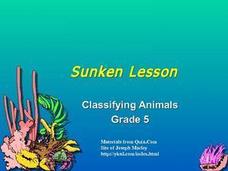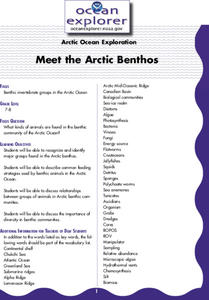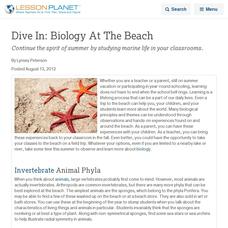Curated OER
Invertebrate Diversity
Students observe different animals with bilateral symmetry. In this biology lesson plan, students compare how these animals move. They discuss the evolutionary history of observed animals.
Curated OER
What Animal Am I?
Students brainstorm different characteristics of invertebrates and investigate invertebrates by conducting Internet research.
Curated OER
Sunken Lesson: Classifying Animals
This PowerPoint features vocabulary and key concepts related to animal classification. Information about levels of classification, traits common to vertebrates and invertebrates, and a description of metamorphosis are included. The text...
Curated OER
Pheed the World: Edible Phyla
Students discuss the contributions of different organisms to our world. In this biology lesson, students research countries with limited food supply. They create an improvement plan for a fictitious country assigned to them.
Curated OER
Invertebrate Classification
Young scholars discuss the recent disovery of the "furry lobster" to peak interest in the animal kingdom. They classify various speciments using invertebrate dichotomous keys, identifying major animal phyla and classes. Thy the complete...
Biology Junction
Segmented Worms - The Earthworm
In this biology worksheet, students color and label the different parts of an earth worm. They complete 41 short answers and fill in the blank questions about earthworms.
Curated OER
The Crusty Fossils
Students identify some of the different species of crabs and tell how they adapt themselves to their environment. They discuss the evolution and stages of development of the crabs. They identify the Phylum Arthropoda and the Class...
Curated OER
Holy Starbucks Batman
Students investigate caffeine as a potential new pollutant in a northwest river system. Effects of caffeine on invertebrates and salmon fry will be explored through field work and lab work.
Curated OER
7th Science Quiz
This seventh grade life science quiz has a professional appearance and well-written multiple-choice questions. However, it seems to cover too broad a variety of biology topics for only 15 questions to fully assess. There is one question...
Curated OER
Biodiversity
In this biodiversity learning exercise, students sort and classify animals by their observable features using a dichotomous key. Students then respond to questions about complete and incomplete metamorphosis.
Curated OER
Spectacular Squid
Students study squid including what family they are in. In this exploratory lesson students view a video, answer questions and complete an activity on squid.
Curated OER
Vertebrates
Students identify and describe five main groups of the Phylum Chordata. They discover that the Phylum Chordata is the vertebrates. Students identify the main difference between invertebrates and vertebrates. They read passages about...
Casimir Middle School
Biological Classification Worksheet
Classify living things with a set of worksheets that has pupils sorting and indentifying living and non-living things. Learners use the worksheets as a basis for finding their answers.
Curated OER
Sponges - A Coloring Worksheet
In this sponges worksheet, students read the information about sponges. Students answer the provided questions about the reading passage. Students color the illustration at the bottom of the page.
Curated OER
Classification of Living Things
In this biology worksheet, learners identify and locate various vocabulary terms relating to the classification of living things. There are 28 biology terms located in the word search.
Curated OER
Ocean Creature Classification
Pupils develop a Taxonomic Key for marine invertebrates from pictures they are given after practicing together with common objects, such as shoes. They then compare their key to a provided Ocean Invertebrates Taxonomic Key.
Curated OER
The Chordates
Pupils study the characteristics of organisms that are a part of the phylum Chordata. In this organisms instructional activity students identify mammals that are native to Saskatchewan.
Curated OER
Diversity And Adaptations Of Organisms
Eighth graders study how and why animals are classified into eight groups in the animal kingdom. They work together to identify organisms. They use the key to determine the phylum for the included problems.
Curated OER
Tackling Taxonomy
Students study physical characteristics of separate phyla and place them into similar groups. This lesson is part of a multi-segmented unit on the diversity of life. students develop a classification system by grouping animals into...
Curated OER
Meet the Arctic Benthos
Students recognize and identify major groups found in the Arctic benthos. They describe common feeding strategies used by benthic animals in the Arctic Ocean. They discuss relationships between
Curated OER
Dive In: Biology At The Beach
Continue the spirit of summer by studying marine life in your classrooms.
Curated OER
Bug's Eye View
Investigate the life of bugs and how they interact with the environment in this integrated science and language arts instructional activity. Young scientists construct mini environments in cages in order to make observations. This data...
Biology Junction
Mollusks
Mollusks created every shell on Earth. Young scientists learn more about the phyllum mollusca in an informative presentation. It covers their characteristics, body plans, and relationships in the ecosystem. Then, it details each class of...
NOAA
Individual Species in the Deep Sea
A tube worm's outer covering is made of chitin, the same material that makes up the shells of lobsters and crabs. Scholars create tube worms and analyze and discuss the longevity of organisms living near cold seeps. They then discuss and...

























